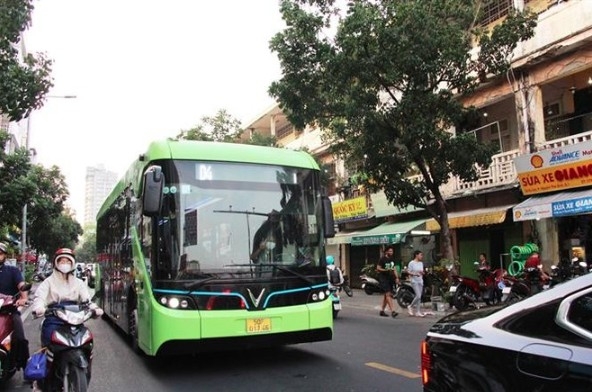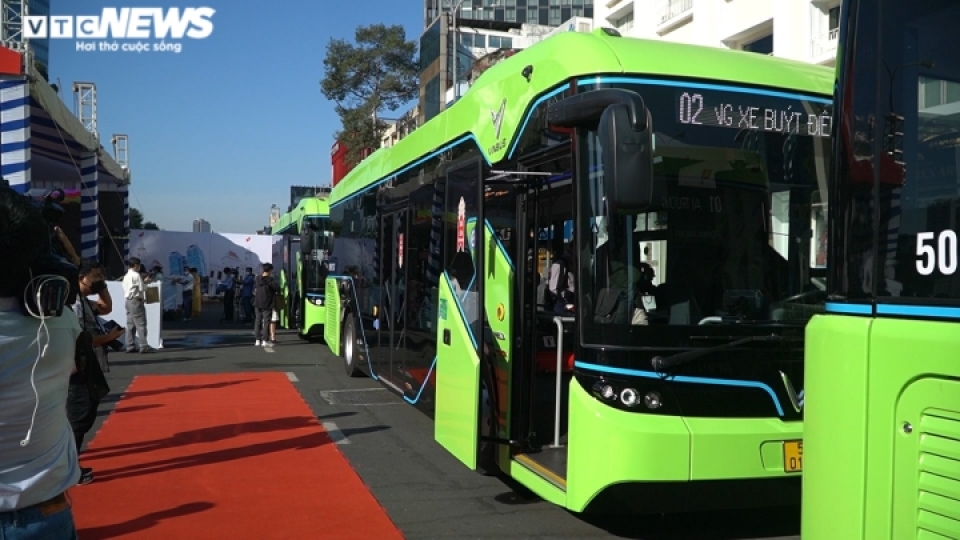HCM City to fully transition to electric/green energy buses by 2030
Ho Chi Minh City is ramping up efforts to make its public transport system greener, with a plan to convert 100% of its buses to electric or green energy by 2030. The initiative is part of a broader roadmap to curb emissions and promote sustainable urban transport.

According to the city’s roadmap, beginning in 2025, all newly launched bus routes will be required to use clean fuels such as electricity or compressed natural gas (CNG). The transition will culminate in a full conversion of the entire bus fleet by 2030.
Starting August 1, the city will launch 37 new subsidised bus routes operated by newly-selected companies. Of the 600 buses on these routes, nearly 300 will run on electricity or CNG, pushing the share of clean-energy buses in the city’s fleet to nearly 50%.
Currently, the city is operating a bus network of more than 2,200 vehicles, with around 700 using electric or CNG, while the rest still rely on gasoline or diesel.
The Ho Chi Minh City Institute for Development Studies (HIDS) has also completed a plan to convert motorbikes used by delivery workers and ride-hailing drivers to electric alternatives. The goal is to convert 80% of the estimated 400,000 motorbikes in this segment - equivalent to 320,000 vehicles - by 2027, with the remainders to follow in 2028. Based on this plan, HIDS has recommended a ban on gasoline-powered motorcycles in app-based ride-hailing services starting in 2029.
Both the public transport and ride-hailing sectors are covered under the city's master plan for controlling vehicle emissions, overseen by the Department of Construction.
In the first phase, the city is focused on developing policies, infrastructure, and incentives to support the shift. Key measures include expanding the electric bus fleet and building a citywide network of charging stations. After the administrative mergence of Ho Chi Minh City, Binh Duong and Ba Ria–Vung Tau provinces, the municipal Department of Construction revises the plan to reflect the new, expanded urban area, with submission to the municipal People's Council expected in the fourth quarter of 2025.
The second phase will provide financial support for replacing old vehicles and offer incentives to switch to electric vehicles. The city is also studying traffic zoning options that would give priority access to electric and green-energy vehicles in central areas, as well as in outlying districts like Can Gio and Con Dao.
Charging infrastructure – a key enabler
Before the mergence, HCM City managed over 9.6 million vehicles, including 8.6 million motorbikes and more than 1 million cars. The post-mergence city is projected to have over 11 million vehicles.
Besides policy incentives, the development of a robust charging infrastructure is seen as essential to accelerating the transition. According to Dr. Le Thanh Hai, director of HIDS's Economic Consulting Centre, the city’s current charging network is fragmented and mostly driven by small private investments. No major public infrastructure projects have been launched so far.
High-powered DC fast chargers (up to 350kW) also risk overloading the local power grid during peak hours. In addition, the city lacks adequate parking and depot facilities to support electric vehicle adoption.
HIDS has proposed building 3,000 charging and battery-swapping stations by 2028, prioritising locations such as petrol stations, public parking lots, shopping malls, and parks.
In parallel, the Public Transport Management Centre under the Department of Construction is working with partners to install 19 large charging stations at existing bus terminals. These facilities will serve nearly 700 electric buses operating on 47 subsidised routes, with full deployment expected by 2027. The project has a total investment of about VND400 billion (approximately US$15.7 million).
The municipal Department of Industry and Trade has pledged to work with the electricity sector to ensure a stable power supply for charging stations and to upgrade power infrastructure in areas at risk of overload.



